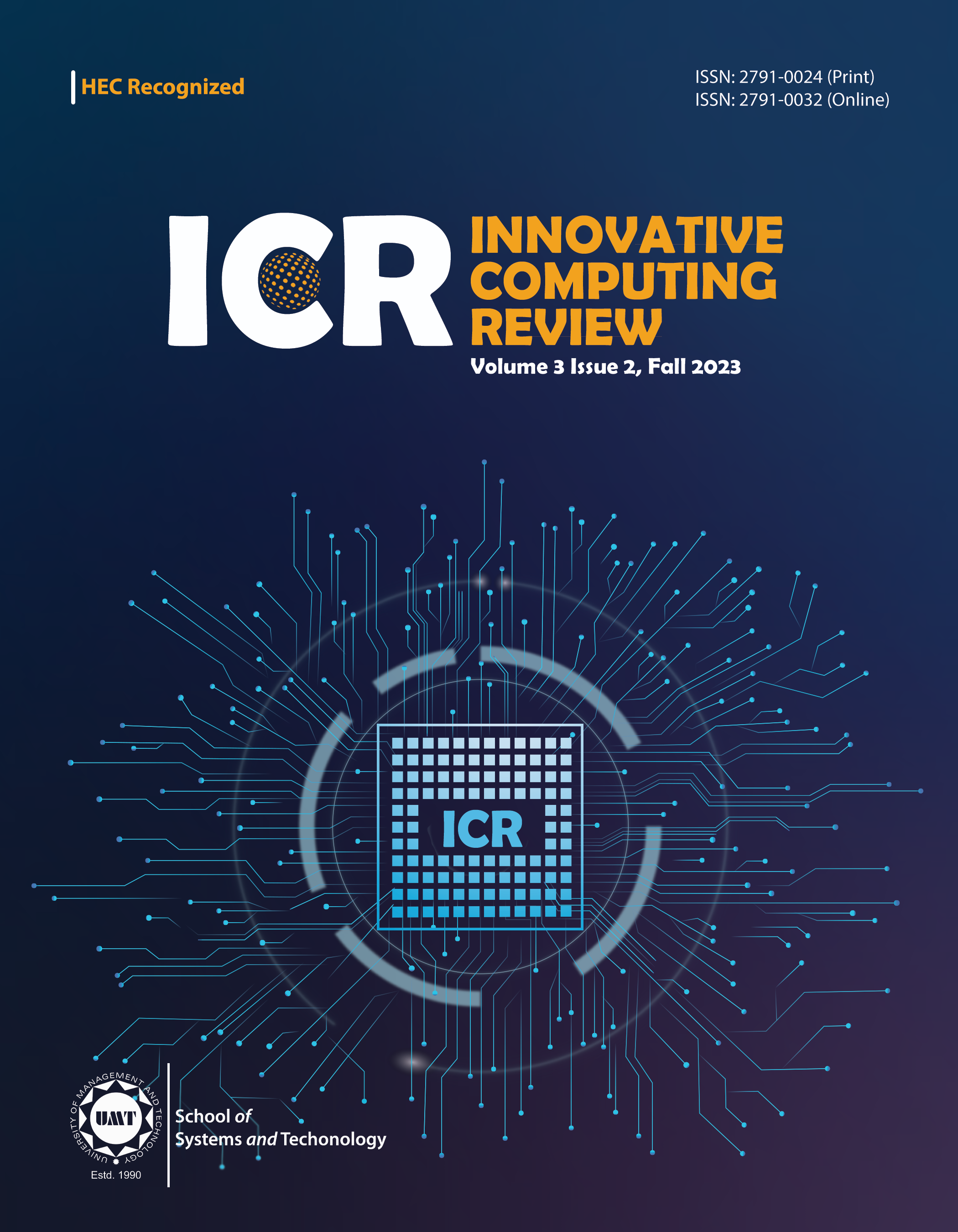E-Satisfaction of Pakistani e-NADRA Website Using System Usability Scale (SUS) Evaluation
Abstract
 Abstract Views: 0
Abstract Views: 0
The current study attempted to evaluate how customers perceive and interact with the 'Pak identity service' offered by the “National Database and Registration Authority” (NADRA). The study specifically aimed to assess the citizens' opinions about the lately introduced e-government service, Pak-identity, in terms of its user-friendliness, adaptation, and artistry. A quantitative approach was employed by using a questionnaire-based survey in order to identify the factors that influence customer e-loyalty. This approach helps to gain insights into how citizens perceive and behave towards this service. The study collected responses from a sample of 25 individuals through random sampling technique to ensure that it aligns with the study's objectives. Additionally, certain measures were taken to ensure the credibility and validity of the scale used in this research. The current study holds a unique position in the context of evaluating e-services in the country. It focused on the attributes related to the quality of web services provided to citizens, with the ultimate goal of enhancing their adoption and acceptance within society.
Downloads
References
D. A. Aaker and E. Joachimsthaler, Brand Leadership. Simon & Schuster, 2012.
M. M. Al-Kasasbeh, S. Dasgupta, and A. H. AL-Faouri, “Factors affecting e-service satisfaction,” Commun. IBIMA, vol. 2011, Art. no. 547937, 2011, doi: https://doi.org/10.5171/2011.547937
F. Ameen, A User Acceptance of Web Personalization Systems: Model Validation using SEM: A PLS-PM Approach with Moderating Effects. Iris Publishing, 2014.
M. Ali, S. Hassan, M. S. Ahmad, Y. Yen, and F. Asmi, “Critical success factors of e-government services in developing countries (A case study of NADRA Pak-identity service),” Info. Know. Manag., vol. 6, no. 11, 2016.
N. J. Ashill and D. Jobber, “The effects of the external environment on marketing decision-maker uncertainty,” J. Mark. Manag., vol. 30, no. 3–4, pp. 268–294, Mar. 2014, doi: https://doi.org/10.1080/0267257X.2013.811281
B. Bender Stringam and J. Gerdes Jr., “Are pictures worth a thousand room nights? Success factors for hotel web site design,” J. Hosp. Tour. Technol., vol. 1, no. 1, pp. 30–49, 2010, doi: https://doi.org/10.1108/17579881011023007
X. Guo, K. C. Ling, and M. Liu, “Evaluating factors influencing consumer satisfaction towards online shopping in China,” Asian Soc. Sci., vol. 8, no. 13, pp. 40–50, 2012, doi: http://dx.doi.org/10.5539/ass.v8n13p40
A. Ilyas, S. H. Wajid, and A. Muhammad, “Usability evaluation of e-government website: A use of system usability scale,” Pak. J. Eng. Technol., vol. 5, no. 1, pp. 11–15, Mar. 2022, doi: https://doi.org/10.51846/vol5iss1pp11-15
B. Hasan, “Perceived irritation in online shopping: The impact of website design characteristics,” Comput. Hum. Behav., vol. 54, pp. 224–230, Jan. 2016, doi: https://doi.org/10.1016/j.chb.2015.07.056
A. Hirst and M. Humphreys, “Putting power in its place: The centrality of edgelands,” Organ. Stud., vol. 34, no. 10, pp. 1505–1527, Oct. 2013, doi: https://doi.org/10.1177/0170840613495330
F. Asmi, R. Zhou, and L. Lu, “E-Government adoption in developing countries: need of customer-centric approach: A case of Pakistan,” Int. Bus. Res., vol. 10, no. 1, pp. 42–58, 2017, doi: http://dx.doi.org/10.5539/ibr.v10n1p42
R. P. Mohanty and R. R. Lakhe, TQM in the Service Sector. JAICO publishing house, 2008.
U. Inayat, M. F. Zia, S. Mahmood, H. M. Khalid, and M. Benbouzid, “Learning-based methods for cyber attacks detection in IoT systems: A survey on methods, analysis, and future prospects,” Electronics, vol. 11, no. 9, Art. no. 1502, May 2022, doi: https://doi.org/10.3390/electronics11091502
U. Inayat, M. F. Zia, S. Mahmood, T. Berghout, and M. Benbouzid, “Cybersecurity enhancement of smart grid: Attacks, methods, and prospects,” Electronics, vol. 11, no. 23, Art. no. 3854, Nov. 2022, doi: https://doi.org/10.3390/electronics11233854
U. Inayat, M. F. Zia, F. Ali, S. M. Ali, H. M. A. Khan, and W. Noor, “Comprehensive review of malware detection techniques,” in 2021 Int. Conf. Innov. Comput., 2021, pp. 1–6, doi:https://doi.org/10.1109/ICIC53490.20 21.9693072
U. Inayat, F. Ali, H. M. A. Khan, S. M. Ali, K. Ilyas, and H. Habib, “Wireless sensor networks: Security, threats, and solutions,” in 2021 Int. Conf. Innov. Comput., 2021, pp. 1–6, doi: https://doi.org/10.1109/ICIC53490.20 21.9693021
A. Humphrey and K. G. Mayoka, “A framework for usability of e- Government services in developing countries,” Glob. Adv. Res. J. Social Sci., vol. 5, no. 1, pp. 1–10, 2015.
S. McLellan, A. Muddimer, and S. C. Peres, “The effect of experience on system usability scale ratings,” J. Usability Stud., vol. 7, no. 2, pp. 56– 67, 2012.
F. Bannister and R. Connolly, “The trouble with transparency: A critical review of openness in e‐government,” Policy Internet, vol. 3, no. 1, pp. 1–30, Feb. 2011, doi: https://doi.org/10.2202/1944-2866.1076
S. Yan and P. G. Ramachandran, “The current status of accessibility in mobile apps,” ACM Trans. Access. Comput., vol. 12, no. 1, pp. 1–31, Mar. 2019, doi: https://doi.org/10.1145/3300176
M. Bakhsh, M. Ali, S. A. Ali, M. T. Ali, and S. Ahmed, “Accessibility evaluation of e-government mobile apps services in Pakistan,” J. Comput. Biomed. Inform., vol. 4, no. 1, pp. 251– 268, 2022.
M. Khalid, F. Yousaf, M. A. Khan, and S. Shaukat, “An empirical examination of e-government virtual services: Mediating role of users’ perceived usefulness,” J. Manag. Res., pp. 99– 128, May 2021, doi: https://doi.org/10.29145/jmr/81/08010 5
Copyright (c) 2023 Hafiz Muhammad Ashja Khan, Abdul Hafeez Muhammad

This work is licensed under a Creative Commons Attribution 4.0 International License.






